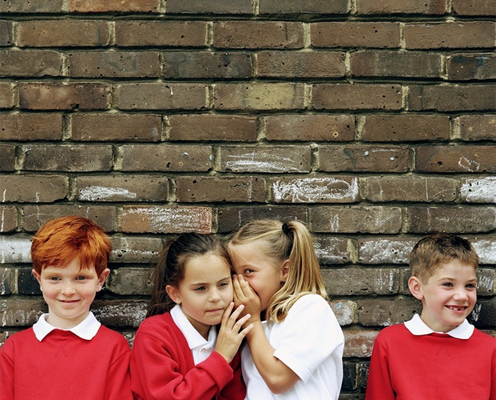5 Things NOT to Teach Your Kids About Money

No elbows on the dinner table. Don’t talk to strangers. A firm handshake will take you far in your career. We teach our children the manners, rules and truisms of life, hoping that they won’t have to learn the hard way—perhaps like we did. But all too often, we forget to talk to our kids about money. Yes, it can be uncomfortable. How do you discuss salary, saving and—gulp—debt? There are just so MANY lessons to be taught—about life, love, happiness and cash flow—that sometimes it’s easier to leave the harder discussions (you know, the ones that can’t be said in three words: ‘Don’t do that!’) for a later time. Well, when it comes to cash, that ‘don’t’ word can come in handy. Forget teaching your kids what they SHOULD do with their cash, and turn the discussion on its head. Here’s what NOT to teach your kids about money.
1. Use credit cards to pay for things you can’t immediately afford—NOT!
The average Canadian family has over $100,000 in debt, according to a report released by the Vanier Institute. This figure represents a real increase of 78% over the past two decades. Not exactly a pretty picture, and certainly not one to which we want our children to aspire. The solution? Get your child in the habit of only buying what he or she can afford at the present time and has saved up for on her own (as in, don’t YOU become the walking version of a credit card to them). Better still, lead by example. Use cash for your purchases and ditch the card. Don’t hesitate to walk your child through your household budget, teaching him how bills are paid, the importance of paying on time and showing her how important it is to be responsible with one’s hard-earned dough. ‘Spend less than you earn’ should be a mantra your children learns NOW.
2. Spend now, save later—NOT!
Children are about as far away from retirement as America is to winning the World Cup. But it’s important for them to realize at a young age just how valuable their savings will be—or, shall we say, can be—one day. Whether that day is when their car breaks down or when they’re ready to move to Florida and retire, it’s essential for kids to learn that what they put aside in savings is just as beneficial to their happiness as what they spend their money on today. It’s about opening their eyes to the short-term and the long-term.
3. If you make more money, you’ll be happier—NOT!
Everyone knows that money can’t buy happiness, right? So why, as adults, do we often find ourselves thinking, ‘If I just made more money, I’d be able to afford [fill in the blank].’ Yeah, maybe—but would you be any happier? A recent study of more than 450,000 Americans found that day-to-day contentment tops out at a $75,000 salary. So rather than teaching your kids to choose whichever career will lead to the most money, you may be better off showing them how to budget their money and spend within their means. What a concept!
4. Ignorance is bliss – NOT!
Although there may be certain times in life when it’s better to keep the kids in the dark (ahem, your son doesn’t need to know all about your time of the month and your daughter need not be privy to daddy’s questionable hockey team banter), when it comes to their personal finances, what your children don’t know can hurt them. So teach your kids about investment options, how to reconcile a checkbook, the rules of banking and lending and what they can do to improve their credit score. Knowledge’of the financial kind’is bliss.
5. Money is evil – NOT!
It’s easy for those of us who don’t bring in as much income as we’d like to envy those who earn more. But sometimes that envy can turn into full-on hatred, resulting in the belief that money is the root of all evil. Au contraire, my friend. While gluttony may in fact be wicked, money can accomplish some amazing things in the world. Feed the hungry. Build a home for someone in need. Send money overseas to help women trying to escape oppression. The list of charitable donation requests is endless, so let your kids help choose whom to support. Get them engaged and get them aware.
When a Don’t Equals a Do
Above all else, remember that a child who is aware of the world around her– how it operates, how it balances and readjusts itself and how one thing affects another– is also in control of her own world and future. Tell her what not to do, and she may just do everything right!















